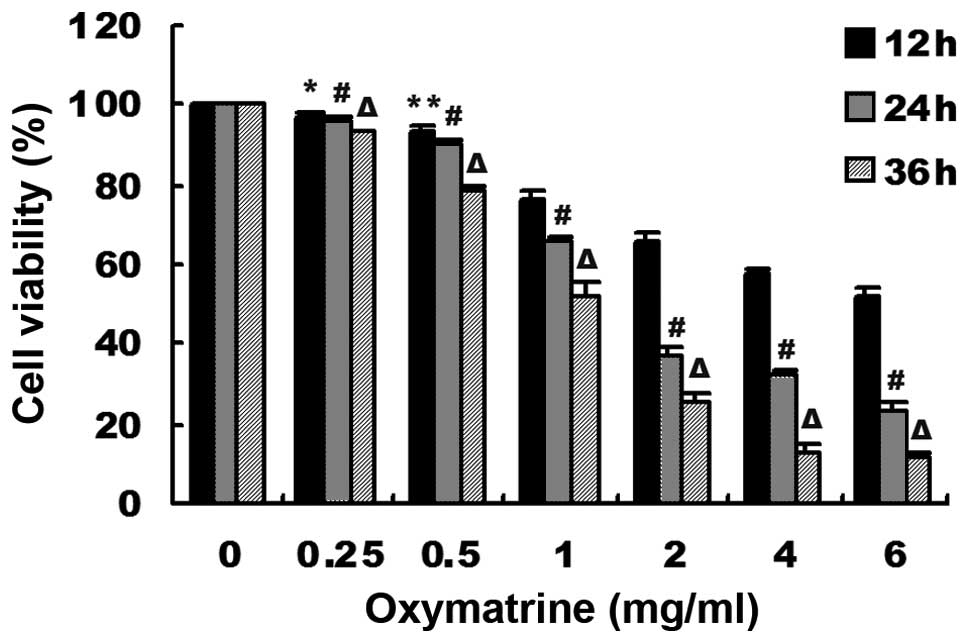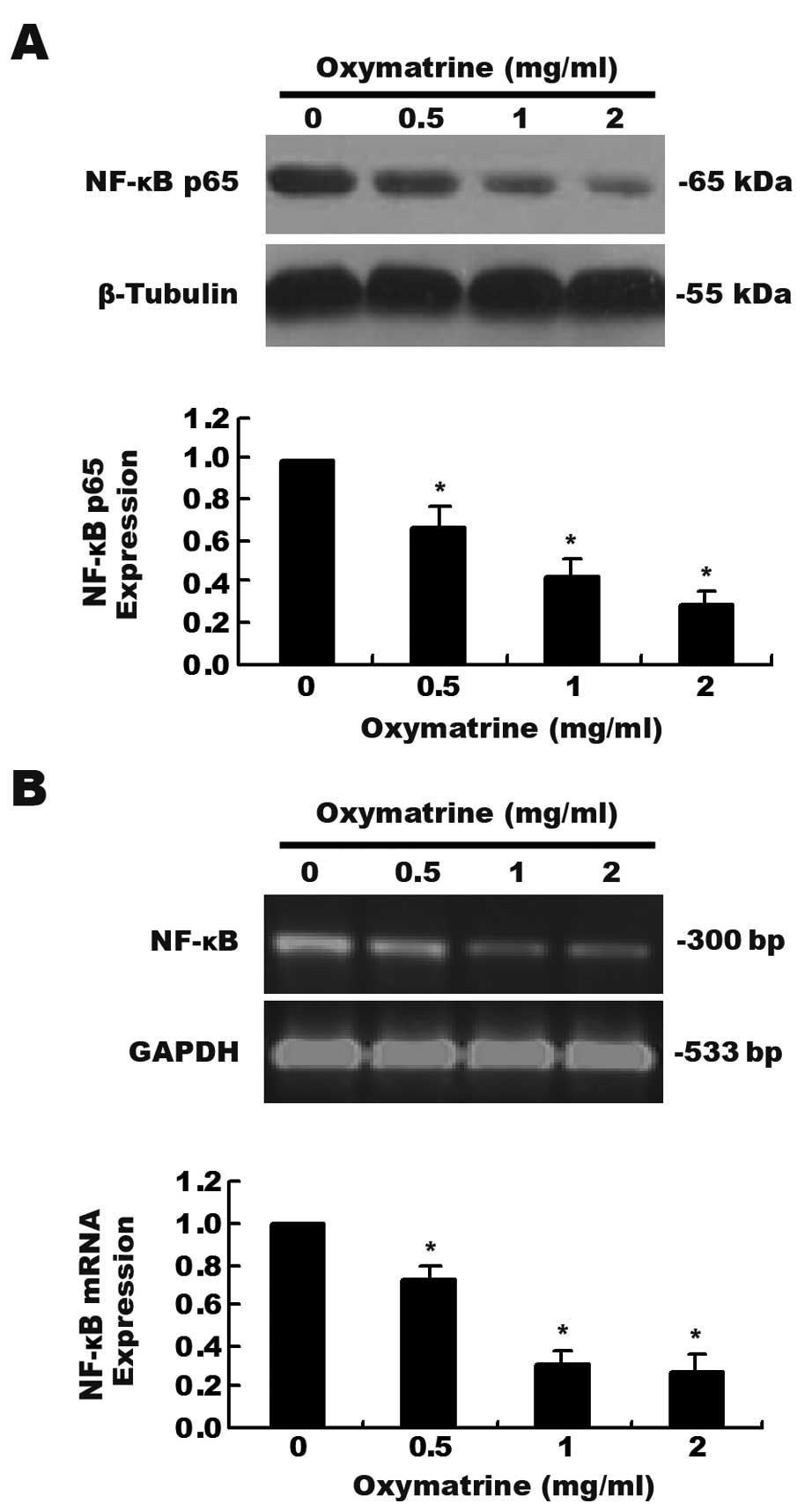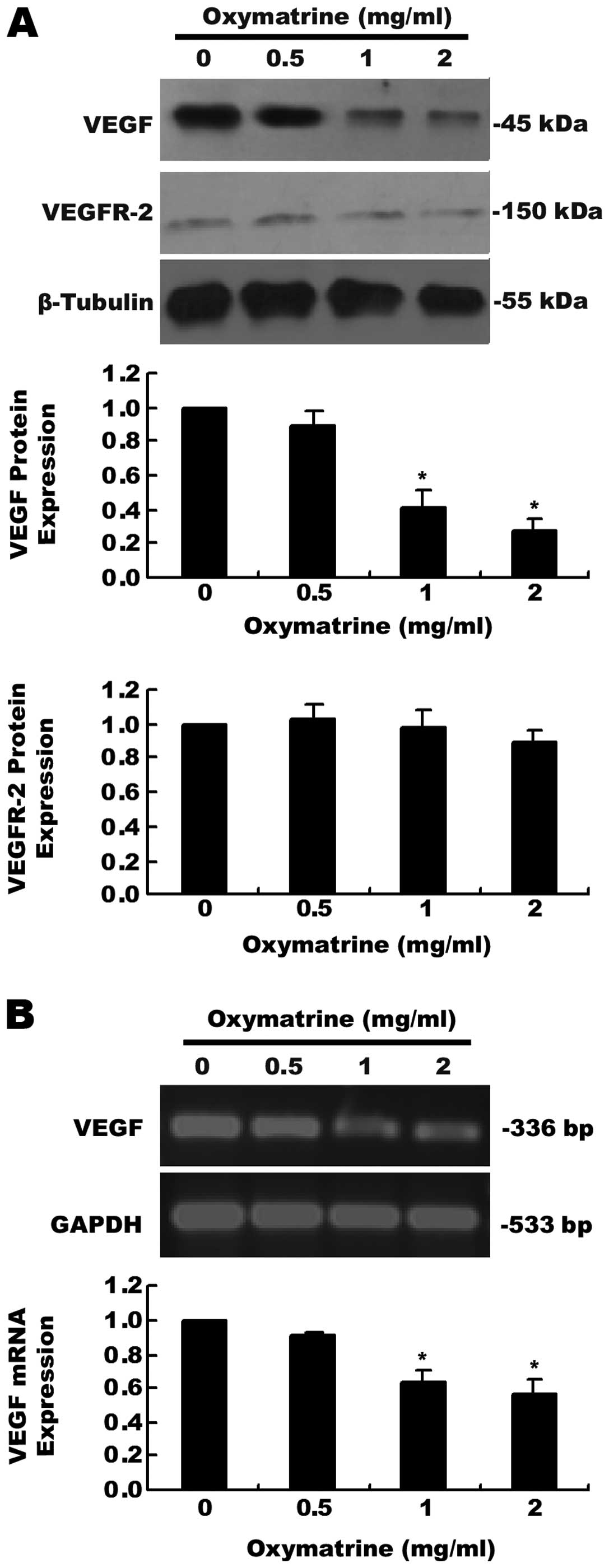|
1
|
Raimondi S, Maisonneuve P and Lowenfels
AB: Epidemiology of pancreatic cancer: an overview. Nat Rev
Gastroenterol Hepatol. 6:699–708. 2009. View Article : Google Scholar : PubMed/NCBI
|
|
2
|
Vincent A, Herman J, Schulick R, Hruban RH
and Goggins M: Pancreatic cancer. Lancet. 378:607–620. 2011.
View Article : Google Scholar
|
|
3
|
Stathis A and Moore MJ: Advanced
pancreatic carcinoma: current treatment and future challenges. Nat
Rev Clin Oncol. 7:163–172. 2010. View Article : Google Scholar : PubMed/NCBI
|
|
4
|
Li-Weber M: Targeting apoptosis pathways
in cancer by Chinese medicine. Cancer Lett. 332:304–312. 2013.
View Article : Google Scholar
|
|
5
|
Lin SZ, Wei WT, Chen H, et al: Antitumor
activity of emodin against pancreatic cancer depends on its dual
role: promotion of apoptosis and suppression of angiogenesis. PLoS
One. 7:e421462012. View Article : Google Scholar : PubMed/NCBI
|
|
6
|
Wei WT, Chen H, Ni ZL, et al: Antitumor
and apoptosis-promoting properties of emodin, an anthraquinone
derivative from Rheum officinale Baill, against pancreatic
cancer in mice via inhibition of Akt activation. Int J Oncol.
39:1381–1390. 2011.PubMed/NCBI
|
|
7
|
Shi GF and Li Q: Effects of oxymatrine on
experimental hepatic fibrosis and its mechanism in vivo. World J
Gastroenterol. 11:268–271. 2005. View Article : Google Scholar : PubMed/NCBI
|
|
8
|
Lu LG, Zeng MD, Mao YM, et al: Oxymatrine
therapy for chronic hepatitis B: a randomized double-blind and
placebo-controlled multi-center trial. World J Gastroenterol.
9:2480–2483. 2003.PubMed/NCBI
|
|
9
|
Ling Q, Xu X, Wei X, et al: Oxymatrine
induces human pancreatic cancer PANC-1 cells apoptosis via
regulating expression of Bcl-2 and IAP families, and releasing of
cytochrome c. J Exp Clin Cancer Res. 30:662011. View Article : Google Scholar : PubMed/NCBI
|
|
10
|
Zhang Y, Liu H, Jin J, Zhu X, Lu L and
Jiang H: The role of endogenous reactive oxygen species in
oxymatrine-induced caspase-3-dependent apoptosis in human melanoma
A375 cells. Anticancer Drugs. 21:494–501. 2010. View Article : Google Scholar : PubMed/NCBI
|
|
11
|
Song G, Luo Q, Qin J, Wang L, Shi Y and
Sun C: Effects of oxymatrine on proliferation and apoptosis in
human hepatoma cells. Colloids Surf B Biointerfaces. 48:1–5. 2006.
View Article : Google Scholar : PubMed/NCBI
|
|
12
|
Zhang Y, Piao B, Zhang Y, et al:
Oxymatrine diminishes the side population and inhibits the
expression of β-catenin in MCF-7 breast cancer cells. Med Oncol.
28(Suppl 1): S99–S107. 2011.PubMed/NCBI
|
|
13
|
Zou J, Ran ZH, Xu Q and Xiao SD:
Experimental study of the killing effects of oxymatrine on human
colon cancer cell line SW1116. Chin J Dig Dis. 6:15–20. 2005.
View Article : Google Scholar : PubMed/NCBI
|
|
14
|
Song MQ, Zhu JS, Chen JL, et al:
Synergistic effect of oxymatrine and angiogenesis inhibitor NM-3 on
modulating apoptosis in human gastric cancer cells. World J
Gastroenterol. 13:1788–1793. 2007. View Article : Google Scholar : PubMed/NCBI
|
|
15
|
Baldwin AS: Control of oncogenesis and
cancer therapy resistance by the transcription factor NF-κB. J Clin
Invest. 107:241–246. 2001.
|
|
16
|
Aggarwal BB: Nuclear factor-κB: the enemy
within. Cancer Cell. 6:203–208. 2004.
|
|
17
|
Carbone C and Melisi D: NF-κB as a target
for pancreatic cancer therapy. Expert Opin Ther Targets. 16(Supp
2): S1–S10. 2012.
|
|
18
|
North S, Moenner M and Bikfalvi A: Recent
developments in the regulation of the angiogenic switch by cellular
stress factors in tumors. Cancer Lett. 218:1–14. 2005. View Article : Google Scholar : PubMed/NCBI
|
|
19
|
Han J, Sun M, Cui Y, et al: Kushen
flavonoids induce apoptosis in tumor cells by inhibition of NF-κB
activation and multiple receptor tyrosine kinase activities.
Phytother Res. 21:262–268. 2007.PubMed/NCBI
|
|
20
|
Wang ZH, Chen H, Guo HC, et al: Enhanced
antitumor efficacy by the combination of emodin and gemcitabine
against human pancreatic cancer cells via downregulation of the
expression of XIAP in vitro and in vivo. Int J Oncol.
39:1123–1131. 2011.PubMed/NCBI
|
|
21
|
Hidalgo M: Pancreatic cancer. N Engl J
Med. 362:1605–1617. 2010. View Article : Google Scholar
|
|
22
|
Liptay S, Weber CK, Ludwig L, Wagner M,
Adler G and Schmid RM: Mitogenic and antiapoptotic role of
constitutive NF-κB/Rel activity in pancreatic cancer. Int J Cancer.
105:735–746. 2003.PubMed/NCBI
|
|
23
|
Wang W, Abbruzzese JL, Evans DB, Larry L,
Cleary KR and Chiao PJ: The nuclear factor-κB RelA transcription
factor is constitutively activated in human pancreatic
adenocarcinoma cells. Clin Cancer Res. 5:119–127. 1999.
|
|
24
|
Scartozzi M, Bearzi I, Pierantoni C, et
al: Nuclear factor-κB tumor expression predicts response and
survival in irinotecan-refractory metastatic colorectal cancer
treated with cetuximab-irinotecan therapy. J Clin Oncol.
25:3930–3935. 2007.
|
|
25
|
Nishi T, Shimizu N, Hiramoto M, et al:
Spatial redox regulation of a critical cysteine residue of NF-κB in
vivo. J Biol Chem. 277:44548–44556. 2002.PubMed/NCBI
|
|
26
|
Gonzalez-Perez RR, Xu Y, Guo S, Watters A,
Zhou W and Leibovich SJ: Leptin upregulates VEGF in breast cancer
via canonic and non-canonical signalling pathways and NFκB/HIF-1α
activation. Cell Signal. 22:1350–1362. 2010.PubMed/NCBI
|
|
27
|
Suboj B, Priya PS, Nandini RJ, et al:
Nimbolide retards tumor cell migration, invasion, and angiogenesis
by downregulating MMP-2/9 expression via inhibiting ERK1/2 and
reducing DNA-binding activity of NF-κB in colon cancer cells. Mol
Carcinog. 51:475–490. 2012.
|
|
28
|
Ye Y, Martinez JD, Perez-Polo RJ, Lin Y,
Uretsky BF and Birnbaum Y: The role of eNOS, iNOS, and NF-κB in
upregulation and activation of cyclooxygenase-2 and infarct size
reduction by atorvastatin. Am J Physiol Heart Circ Physiol.
295:N343–N351. 2008.
|
|
29
|
Ferrara N and Alitalo K: Clinical
applications of angiogenic growth factors and their inhibitors. Nat
Med. 5:1359–1364. 1999. View
Article : Google Scholar : PubMed/NCBI
|
|
30
|
Ferrara N: Role of vascular endothelial
growth factor in regulation of physiological angiogenesis. Am J
Physiol Cell Physiol. 280:1358–1366. 2001.PubMed/NCBI
|
|
31
|
Brawer MK: Quantitative microvessel
density. A staging and prognostic marker for human prostatic
carcinoma. Cancer. 78:345–349. 1996. View Article : Google Scholar : PubMed/NCBI
|
|
32
|
Hlatky L, Hahnfeldt P and Folkman J:
Clinical application of antiangiogenic therapy: microvessel
density, what it does and doesn’t tell us. J Natl Cancer Inst.
94:883–893. 2002.PubMed/NCBI
|
|
33
|
Lassau N, Chebil M, Chami L, Bidault S,
Girard E and Roche A: Dynamic contrast-enhanced ultrasonography
(DCE-US): a new tool for the early evaluation of antiangiogenic
treatment. Target Oncol. 5:53–58. 2010. View Article : Google Scholar : PubMed/NCBI
|
|
34
|
Claudon M, Cosgrove D, Albrecht T, et al:
Guidelines and good clinical practice recommendations for contrast
enhanced ultrasound (CEUS) - update 2008. Ultraschall Med.
29:28–44. 2008. View Article : Google Scholar : PubMed/NCBI
|



















